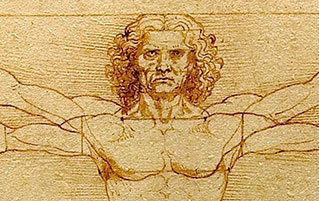5 B.S. Renaissance Myths You Learned in History Class

When you hear the word "Renaissance," chances are it summons up a mental image of brilliant artists effortlessly crapping out masterpieces and inventions, like a never-ending TED Talk in pantaloons. But some of what you think you know is wrong, some of it is misconstrued, and most of it just left your head completely the minute 8th grade history ended. But in case it's still knocking around in there, you should know ...
The Rediscovery of the Classics Did Not Start the Renaissance
The Myth:
The Renaissance began in the 15th century, because that's when people rediscovered Plato, Socrates, and Aristotle for the first time in centuries ... and then, boom! Everything's got primitive engines and tiny dicks on it. All thanks to the power of reading.

"I won't say I told you so, but I totally did."
The Reality:
Translators and scribes busting hump for Charlemagne banged out copies of Latin classics during the (not so) Dark Ages, too. Over the next few centuries, Italian and French scholars translated Arab and ancient Greek philosophy, math, and medical texts as well. So by the 12th century, students in Western Europe had access to an extensive library of Classical and Eastern knowledge. The Dark Ages may not have had Google Books, but hey, it was way more than the "nothing" we've all been told.
But if all that ancient knowledge was there all along, why wasn't there a Renaissance sooner?
Actually, there was. Twice. The Carolingian Renaissance and the Twelfth-Century Renaissance happened before the Renaissance, though they're both largely relegated to footnotes in our history books. Why? Because they lacked the one thing that makes the Renaissance stand out: stupid pants. Wait, no -- they had plenty of those. What these proto-Renaissances really lacked was any significant, memorable advancement of the arts. And the reason for that was simple: money.

Thankfully, the groundwork was eventually laid for us to have both money and stupid clothes.
As the Middle Ages wound down, Florence's pockets were bulging thanks to its textile industry. By the 15th century, Florence was like Wall Street before the subprime bubble burst: lots of people getting rich, not by perpetually toiling but simply by moving income around. Merchants and bankers suddenly possessed the ability to make it rain like only kings, popes, and unhappy druidic weather-gods could before. They also possessed something entirely novel at this point in human history: the leisure time to appreciate things.
So they looked around themselves ... and found jack-all to appreciate. They needed something to fill the void until we could get the Internet up and running, so they turned to art. Sculptures, paintings, and frescoes found a much wider audience than ever before, and artists were suddenly in high demand. We, as a species, were well aware of much of the knowledge attributed to the Renaissance. It hadn't necessarily been lost or neglected for thousands of years -- we just kind of lump it in as being "rediscovered" at the time because there were a lot of new paintings of robust naked women and sketches of death machines coming out. It must have been an era of enlightenment.

"After this, feel like going for a ride in my murder-matic?"
The Renaissance Did Not Respect or Preserve the Past

The Myth:
It's downright amazing just how many of Italy's ancient buildings and monuments have stood the test of time, isn't it? No doubt a lot of that is thanks to the Renaissance, which rekindled an appreciation for all things ancient ... right?
The Reality:
While Renaissance scholars were busy searching for rare Classical texts, builders and architects were busy tearing down all the places where those texts had been written. Buildings were destroyed to recycle their stone for new projects. Some were torn down simply to make room for new construction. Countless ancient marble statues were melted down to procure lime. It was simply too much trouble to haul in new materials when stupid, useless old stuff like the Temple of Hercules and the Colosseum were sitting right there, just begging to be ransacked. Sure, we think of them as priceless relics of the past -- but if you lived next to one back in the day, it was just a big white tenement waiting to be pilfered.

"Help me carry this thing inside. I'm leaving for the weekend and want it to look like somebody's home."
Pagan sites weren't the only ones hit, either -- even the oldest church in Christendom fell victim to the ancient equivalent of meth-heads stripping copper wire: After standing for 1,200 years, St. Peter's Basilica was demolished so that a new cathedral could be built over it. Naturally, the new St. Peter's was built, in part, with stone quarried from the Colosseum -- possibly as a tribute to all those ancient Christians who were never actually fed to lions there.

"No thanks; the whole 'no gluttony' rule tends to make 'em all stringy."
The Renaissance Was Not a Peaceful Era

The Myth:
The Renaissance was a whole century of painting, music, cherubs, and ridiculous facial hair. It was the hipster of eras. And nobody's more laid back and peaceful than a hipster just trying to get his art on, right?

The high collar both indicated status and hid any ironic neck tattoos.
The Reality:
While the Renaissance masters adorned cathedrals and created masterpieces, Vlad Dracula decorated pikes with his enemies' heads. He was hardly an exception: England tossed over 100,000 lives into an argument over who should be king. Venice and everything east of it spent a century fighting the Ottoman Empire. Germany lost its collective shit in a knights' revolution, followed by a peasants' revolution -- take the two together, and you end up with enough terror and bloodshed to make the French Revolution seem like a Smurf village.

That's not oil paint.
Starting in 1494, Italy was the site of a series of wars that lasted 60 years and involved every major Western European power. To deal with the increasing frequency, duration, and intensity of all these wars, European leaders began establishing standing armies ... which in turn helped fuel further increases in the frequency, duration, and intensity of all these wars. Prior to 1500, an average army might have had 15,000 soldiers; by the end of the 16th century, armies were over five times larger. It was exactly like the endless military build-up of the Cold War, just with a hairy dude holding a spear instead of a stealth bomber.
Renaissance Rome Was Not a Magnificent Cultural Center

The Myth:
Renaissance Rome must have been a spectacular sight indeed. If science would only hurry its ass up with that chrono-phonebooth, we'd all travel straight back there to snap ourselves some pics of it in all its artistic glory. Then we'd run them through a shitty filter and fill them with misspelled hashtags, because that's how the future rolls, bitches.

#selfie
The Reality:
Want to see what Renaissance Rome looked like? Head to modern-day Detroit. While Northern Italian cities flourished thanks to surging wealth and an influx of artisans, Rome was a depopulated, fetid wasteland with a booming outlaw population. When the pope ditched Rome in the 1300s for a way cooler castle in France, things pretty much fell apart. Rome relied on him for everything: his treasury, his guards, his stabilizing influence ... not to mention the pilgrims, tourists, and donations his holiness attracted. Rome needed him back, and bad. But thanks to dogmatic and political schisms, he didn't return until more than a century later, at the dawn of the Renaissance. By then, Rome had let herself go (and she wasn't exactly in cherry condition to begin with).

On the plus side, house cleaning was pretty straightforward.
At the height of the Renaissance, Rome's population had fallen to its lowest ever: Just 10,000 inhabitants lived in a city that had once been home to as many as a million. The city eventually bounced back, of course, but that wasn't until the tail end of the Renaissance. No, when the pope first returned, he found Rome to be a post-apocalyptic hellhole filled with the townspeople from Beyond Thunderdome. The few non-criminal citizens left grazed their cows in the Forum; the most exciting contest taking place in the Circus Maximus was seeing whose sheep could drop the biggest load. Even the holy city's churches were rotted-out shells of their former medieval glory. Worst of all, Rome's esteemed citywide sewer system had been destroyed by invading tribes during the fall of the Roman Empire and never rebuilt, so large parts of the Eternal City were now literally shit holes.
The Renaissance Was Not the Age of Enlightened Thinkers

The Myth:
After the archaic superstition of the Middle Ages, the Renaissance was a breath of fresh air -- rational, reasonable air, where before there had been only fire and knives to breathe.
The Reality:
The drunken liberal arts college that was Renaissance-era Europe didn't have much room for fields like scientific inquiry -- there was literally no curriculum for what was then called "natural philosophy." In fact, science historians "consider the Renaissance an actual step backward from the more scientifically curious Middle Ages." That's presumably because everyone was too busy fondling their magic wands to worry about actual science.

When they weren't busy cupping their balls, that is.
Pretty much every Western occult tradition can trace its origins to the Renaissance, because the literati of the period got way into witchcraft. Think today's Ghost Hunters are annoying? During the Renaissance, they would've been university professors instead of deep-cable buffoons. An entire generation of scholars learned, practiced, and taught astrology, necromancy, goety (invoking spirits), and alchemy.

It was a golden age of decorative skull placement.
Ah, but you can't make a witchcraft-omelet without burning a few eggs: There had been few if any sorcerer slayings in the thousand years prior, but the renaissance brought three waves of intensifying witch hunts that killed thousands across Europe. Suddenly, women who were once praised by their communities as healers found themselves on the receiving end of a purely objective and rational drowning. Historians place the number of prosecuted witches during humanity's "enlightened era" somewhere between 50,000 and 200,000. Yep, they were "enlightening" something, all right.
You can't really blame the witch hunters, though. After all, they were only following the manual. A witch-hunting guide called the Malleus Maleficarum -- The Witch Hammer -- was at least partially responsible for this uptake in superstitious genocide. See, the printing press was the Internet of the Renaissance, and the presses didn't just print Bibles and educational texts. They printed whatever you put into them. Material was at the whim of public demand. And what sounds like a more entertaining read to you: Nicomachean Ethics or the fucking Witch Hammer?! You can practically hear a guitar solo just reading the title.

"Art thou ready to ROCK?!"
And that's why the Renaissance's hippest fad was mass, ill-advised murder. Kind of makes you thankful all we got was the Harlem Shake.
J. is working on a book; it's about sex and money. Message him here to help start a bidding war.
Always on the go but can't get enough of Cracked? We have an Android app and iOS reader for you to pick from so you never miss another article.
Related Reading: People believe a lot of lies about history. The American Revolution didn't go at all the way you've heard. And while we're at it, the idea that Hunter-Gatherers lived a life of miserable starvation is bullshit too. Not even the Middle Ages are safe from this lie parade!

